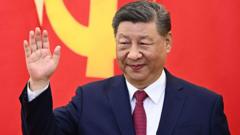In a bid to bolster relationships in Southeast Asia, China's President Xi Jinping has embarked on a significant tour, beginning in Vietnam. During his visit, Xi urged Vietnamese leaders to join him in resisting “unilateral bullying,” a veiled reference to the United States, although he refrained from explicitly naming the country. This statement is seen as part of a broader strategy to present China as a defender of global free trade amidst a fractious trade war between the US and China.
Much of Xi's trip, which will also include meetings in Malaysia and Cambodia, is being characterized as a "charm offensive." His call for cooperation came after US President Donald Trump imposed a 145% tariff on most Chinese goods and indicated a pause on Vietnamese tariffs that could reach 46%. Trump publicly accused Xi's diplomatic initiatives of being strategically aimed at undermining US interests.
Stephen Olson, a former trade negotiator for the US, views Xi's rhetoric as a clever tactical maneuver, contrasting China's commitment to a rules-based trading system against what he perceives as America's reckless trade policies under Trump. The trade tension has escalated significantly, with China's reciprocal tariff responses indicating a deeply entrenched conflict that raises concerns globally.
During a press briefing, Trump remarked on Xi’s meeting with Vietnamese officials, implying that it was a collaborative effort to devise ways to undermine the US. He underscored his administration's hard stance on trade policies towards both China and Vietnam, calling attention to the complexities of economic relationships in the region.
As Xi continued his journey, he was greeted warmly in Vietnam, indicative of the complex relationship the two nations share—one that is marked by both competition and cooperation. Analysts like Susannah Patton from the Lowy Institute highlighted the challenge Vietnam faces in balancing its relations with both the US and China, suggesting that while China offers economic partnership, it is also a competitor.
Xi's upcoming visits to Malaysia will further allow him to build alliances, with local infrastructure projects backed by Chinese technology companies. Patton predicts that Xi will strive to frame the narrative of US trade practices as unreliable, positioning China as a steadfast partner in contrast, which may heavily influence regional sentiments in the coming years.
As the dynamics of the Southeast Asian geopolitical landscape continue to shift, Xi's tour underscores a critical moment where alliances and economic strategies will play pivotal roles amid escalating global trade tensions.
Much of Xi's trip, which will also include meetings in Malaysia and Cambodia, is being characterized as a "charm offensive." His call for cooperation came after US President Donald Trump imposed a 145% tariff on most Chinese goods and indicated a pause on Vietnamese tariffs that could reach 46%. Trump publicly accused Xi's diplomatic initiatives of being strategically aimed at undermining US interests.
Stephen Olson, a former trade negotiator for the US, views Xi's rhetoric as a clever tactical maneuver, contrasting China's commitment to a rules-based trading system against what he perceives as America's reckless trade policies under Trump. The trade tension has escalated significantly, with China's reciprocal tariff responses indicating a deeply entrenched conflict that raises concerns globally.
During a press briefing, Trump remarked on Xi’s meeting with Vietnamese officials, implying that it was a collaborative effort to devise ways to undermine the US. He underscored his administration's hard stance on trade policies towards both China and Vietnam, calling attention to the complexities of economic relationships in the region.
As Xi continued his journey, he was greeted warmly in Vietnam, indicative of the complex relationship the two nations share—one that is marked by both competition and cooperation. Analysts like Susannah Patton from the Lowy Institute highlighted the challenge Vietnam faces in balancing its relations with both the US and China, suggesting that while China offers economic partnership, it is also a competitor.
Xi's upcoming visits to Malaysia will further allow him to build alliances, with local infrastructure projects backed by Chinese technology companies. Patton predicts that Xi will strive to frame the narrative of US trade practices as unreliable, positioning China as a steadfast partner in contrast, which may heavily influence regional sentiments in the coming years.
As the dynamics of the Southeast Asian geopolitical landscape continue to shift, Xi's tour underscores a critical moment where alliances and economic strategies will play pivotal roles amid escalating global trade tensions.



















